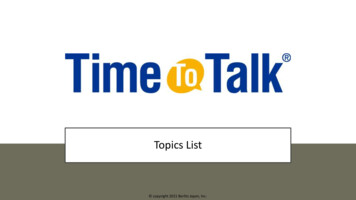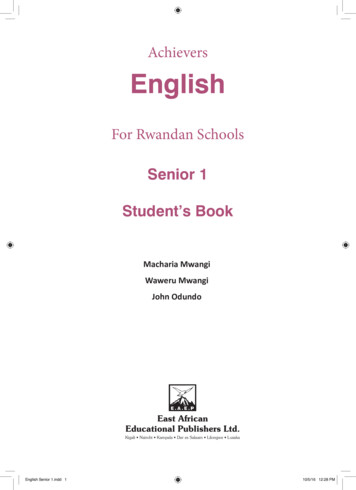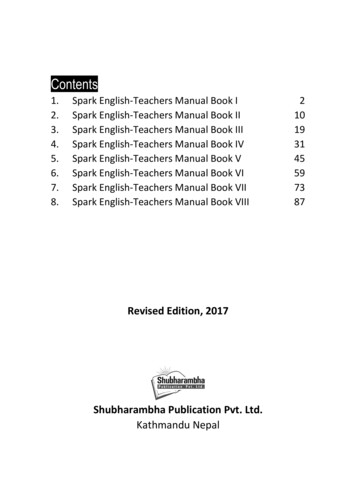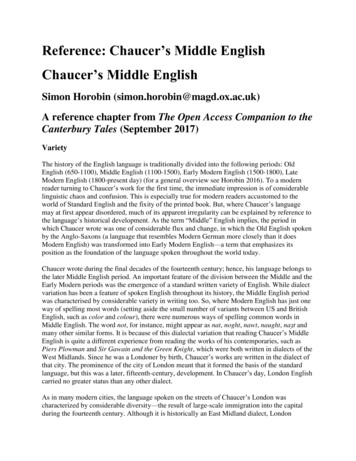
Transcription
English for high achievers in theacademic and professional worldInformation for candidatesCertificate in Advanced English (CAE)www.cambridgeenglish.org/advanced
How to use this guideYou can print this document if you wish, but it is better toread it on screen. Click the links in the document to accessother useful online resources such as videos and practicetests, and to find the information you need.Aboutthe examPreparingExam dayAfterthe examWhat does Cambridge English: Advanced involve?Cambridge English: Advanced is at Level C1 of the Common European Frameworkof Reference for Languages (CEFR). It is accepted by universities, employers andgovernment departments worldwide as an indication that you have achieved a highlevel of skill in the English language. Preparing for Cambridge English: Advancedhelps learners develop the skills to make the most of studying, working and livingin English-speaking countries. It can be taken in both paper-based and computerbased formats.Cambridge English Language Assessment carries out extensive research to ensurethat you get the fairest, most accurate result, and that the exam is relevant to therange of uses for which you need English.About the examHere’s a summary of what’s in the exam:Paper detailsWhat’s in the paper?Skills assessedReading andUse of EnglishThere are eight parts and56 questions altogether.The Reading and Use of Englishpaper tests your reading skillsand your underlying knowledgeof vocabulary and grammar.You will be assessed on:1 hour 30 minutesParts 1–3 are text based and involvechoosing or supplying a missingword, or forming a new word.Part 4 is sentence based andinvolves writing a sentence ina different way.Parts 5–8 are text based and areaccompanied by comprehensiontasks. The task types are multiplechoice, a gapped text with missingparagraphs, and multiple matching.In one part you will need to readacross four short texts. The textsare not for a specialised readershipand can be fiction or non-fiction,but are often academic in nature. a wide range of language atword, phrase, sentence andtext level reading for main ideas, specificinformation, text structure,implication and tone.2
Paper detailsWhat’s in the paper?Skills assessedWritingThere are two parts and you willwrite 220–260 words for each part.You will be assessed using thecriteria Content, CommunicativeAchievement, Organisation andLanguage.1 hour 30 minutesSee page 14 for more detail.In Part 2 you have a choice of taskand will write one of the following:a letter, proposal, report or review.There will be a clear context, topic,purpose and target reader foryour writing.Aboutthe examPreparingPart 1 is a compulsory task whereyou will write an essay based ontwo points given in an input text,explaining which point is moreimportant and giving reasons foryour opinions.ListeningExam dayApproximately40 minutesAfterthe examSpeaking15 minutesPaired: two(occasionally three)candidates togetherThere are four parts and 30questions, covering short extracts,a long monologue, an interview ordiscussion and short monologueson a particular theme. Tasksinclude multiple choice, completingsentences, and multiple matching.This tests your ability to listenfor a wide variety of real-lifepurposes. You might be listeningfor the gist of a whole extract,for specific information, or thespeaker’s opinion, attitude orfeeling.There are four parts in the Speakingtest. It starts with a brief introductoryexchange between each candidateand the examiner. In the second part,you are given some pictures to talkabout on your own. In Part 3 you willdiscuss some ideas based on writtenprompts with the other candidate.Finally there will be a discussionrelated to the themes in Part 3, inwhich you will need to give and justifyopinions and discuss topics in moredepth than in earlier parts of the test.You’re tested on many things.Apart from grammar andvocabulary, you are assessed onyour pronunciation as well as yourability to organise your thoughts,initiate and maintain a discussion,and reach a decision throughnegotiation.See page 13 for more detail.Your overall performance is calculated by averaging the scores you achieve inReading, Writing, Listening, Speaking and Use of English.The weighting of each of the four skills and Use of English is equal.xxDownload a complete sample paper.xxTry a computer-based practice test.(Please note you will need to use the Firefox or Chrome browser to view these sample tests.)xx Watch a video of a Speaking test.xxRead an examiner’s comments on the candidates’ performances.3
Before the exam – preparationAboutthe examPreparingExam dayIt is important to familiarise yourself with the tasks and what they demand of you,and to get accustomed to doing them. They are designed to enable you to showthat you can do in English, but you will only be able to do this if you understand whatis involved and what is being tested. For example, in the Writing test if you are notfamiliar with the type of tasks, do not know which particular skills are being assessedor are not used to writing within a time limit, then you may not be ableto demonstrate your true ability.Although knowledge of grammar and vocabulary is certainly important, it is essentialto realise that you are being assessed on a range of skills and on your communicativeability. So, for example, in the Speaking test you are assessed on your ability tointeract with your partner and keep a conversation going, as well as use of language.To help you feel really prepared for Cambridge English: Advanced, there is a range offree exam preparation resources, including: tips and FAQs for each exam paperAfterthe exam sample papers.To support learners as they prepare for their exams, Cambridge EnglishLanguage Assessment and Cambridge University Press have developed a rangeof official preparation materials, including coursebooks and practice tests.How much do you know about studyingfor Cambridge English: Advanced?Can you answer these questions?1.Where can I find out exactly what I have to do in each part of the test?2.How important is it to spend time doing practice tests?3.How can I practise grammar and vocabulary to prepare for the test?4.What kinds of things should I be reading apart from coursebooks?5.How can I improve my writing skills?6.What can I listen to outside the classroom to improve my listening skills?7.What is the best way to develop my speaking skills?Find the answers on the next page4
ANSWERSStudying for Cambridge English: Advanced1. Where can I find out exactly what I have to do in each part of the test?Aboutthe examYou can download a sample paper and find more information about each partof the test on the Cambridge English Language Assessment website.2. How important is it to spend time doing practice tests?PreparingExam dayAfterthe examIt is very useful to do practice tests as it will help you to become familiar with thedifferent types of tasks. It is also important to practise doing a test within the settime limits. When you look at the answers, think carefully about the ones you gotwrong and why. When doing practice Writing and Speaking tests, it is important tolook at how you will be assessed. Remember, though, that doing practice tests shouldbe just part of your exam preparation. You need to take a long-term approach toyour communicative language ability, analysing your own strengths and weaknessesacross all language skills and thinking about how you can improve. This approachcan help you develop the skills you need beyond the exam, as well as improvingyour exam performance.3. How can I practise grammar and vocabulary to prepare for the test?There are many ways to improve your awareness of vocabulary and grammar forthe test. Apart from looking at past papers, it is very useful to use a monolingualdictionary while you are preparing for the exam. These dictionaries contain thekind of information that you will need to know in all parts of this paper, includinginformation about: collocations and fixed phrases (words that go together) – e.g. have a rest dependent prepositions – e.g. apply for register and style – e.g. formal, informal, literary idiomatic language – e.g. to put your foot in it word families and affixes – e.g. act, react, reaction.Reading widely will also help you as it will increase your awareness of how languageis used in terms of grammar and vocabulary within written text.5
4. What kinds of things should I be reading apart from coursebooks?The Reading and Use of English paper will contain a wide range of texts.Try to read as many types of text as possible, such as: articles from newspapers and magazines, and non-technical journals,reports and reviews biographies, novels and short stories.Aboutthe examPreparingAll of these types of text can be found online.Remember that the reading tasks test reading in different ways, so prepare yourselffor this. For example, sometimes try just skim-reading an article, setting yourselftime limits to force yourself to read quickly for main ideas. You can then try practisingreading in detail; make sure you understand everything within each paragraph.Varying the way you read will help you to develop the different skills you willneed in the exam.Exam day5. How can I improve my writing skills?Afterthe examSome useful tips for preparing for the Writing paper are: Read widely to familiarise yourself with the conventions and styles of different typesof writing (i.e. reports, proposals, reviews, letters and essays). The internet is anexcellent place to look for these different text types. Write 10-minute plans for a variety of questions in past papers, so that planningbecomes automatic and quick. Look at model answers in coursebooks to see what is expected at C1 level.This will help you to see how answers should be structured and to get an idea ofthe variety of grammatical structures and range of vocabulary that is required. Practise writing under exam time conditions so that you get used to writingaccurately to a time limit. Familiarise yourself with the assessment criteria – Content, CommunicativeAchievement, Organisation and Language.You can find more information about how Cambridge English: Advanced Writing isassessed here.6
6. What can I listen to outside the classroom to improve my listening skills?Try to listen to as wide a variety of things as possible and get used to listening topeople with different accents. Internet podcasts are very useful, as are English TVchannels and radio stations. Listen to a range of programmes, including: news broadcasts interviews and discussion programmesAboutthe examPreparingExam dayAfterthe exam documentaries talks plays and drama You can also listen to our audio series Virtually Anywhere.7. What is the best way to develop my speaking skills?The best thing to do is to take every opportunity to speak English. Try to use Englishin a wide range of contexts – different topics, different people and different purposesfor speaking. Also remember to familiarise yourself with the assessment criteria usedin the Speaking exam: Grammatical Resource, Lexical Resource, Discourse Management,Pronunciation and Interactive Communication.You can find information about how Cambridge English: Advanced Speaking isassessed here.7
How much do you know aboutpractical things to do before the exam?Can you answer these questions?Aboutthe examPreparingExam dayAfterthe exam1.How can I find practice tests?2.How do I register for the exam or find a centre?3.Can I delay taking a particular paper if I don’t feel ready for it?4.What is the Notice to Candidates?5.What do I need to take with me on exam day?6.How do I register for results online?Find the answers on the next pageI am preparing for Cambridge English:Advanced because I really want tostudy in England, and the qualificationwill be really helpful.Lisa Schell, Germany8
ANSWERSPractical things to do before the exam1. How can I find practice tests?Aboutthe examOfficial books of practice tests are available online or from bookshops.There are also free sample tests on our website.2. How do I register for the exam or find a centre?PreparingExam dayAfterthe examIf you are already at a school that offers a course in your exam, speak to yourschool about your exam booking. If you are registering independently, you can finda centre that offers your exam here. You can register directly with the exam centre.They will be able to give you advice about preparation, and tell you how much yourexam will cost.3. Can I delay taking a particular paper if I don’t feel ready for it?No, all papers must be taken in a single session. The Speaking test is often takenon a different day from the other papers.4. What is the Notice to Candidates?The Notice to Candidates is a list of things you can and can’t do in the exam room.Your exam centre will give you a copy, but you can also see a copy online here.5. What do I need to take with me on exam day?You must bring identification, for example your passport or national ID card.A bottle of water is a good idea. You can take pens and pencils, but your centrewill also provide these.You will not be allowed to keep your phone or anything else electronic inside theexam room. Your school or exam centre should have told you whether they will beable to store these items securely - if they can’t you should consider leaving yourelectronic items at home. If you are not sure, contact your school or exam centrebefore the exam day to find out what storage they can provide.6. How do I register for results online?When you register for the exam, you will receive a Confirmation of Entry.This will show the web address for our Results Online site, as well as your candidateID number and secret number, which you will need to use to register to receiveyour results online. It is a good idea to register a few weeks before your exam.9
Exam dayAboutthe examPreparingThe exam day can be a nerve-racking experience, however well you have prep
Achievement, Organisation and Language. You can find more information about how Cambridge English: Advanced Writing is assessed here. 7 After the exam Exam day Preparing About the exam 6. What can I listen to outside the classroom to improve my listening skills? Try to listen to as wide a variety of things as possible and get used to listening to people with different accents. Internet .










